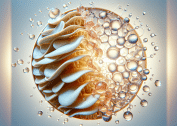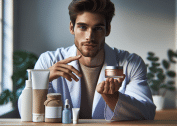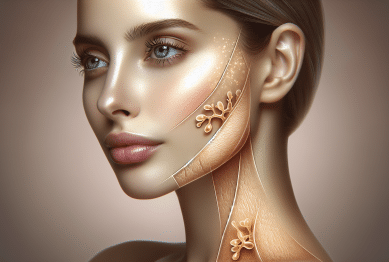Discover practical skin health strategies and unexpected beauty tips that go beyond conventional wisdom. Get insights into the science of glowing skin, the real impact of diet and wellness, and savvy cosmetic skincare routines to help you look and feel your best.
Discovering What Really Creates Glowing Skin
Healthy, radiant skin is more than a trend—it’s a reflection of overall wellness. While many reach for topical treatments promising to transform dullness, research highlights that underlying lifestyle factors often matter just as much. Hydration, balanced nutrition, and consistent routines lay the foundation for a natural glow that lasts. Taking care of your skin doesn’t require elaborate rituals or the most expensive serums. Instead, it’s about embracing comprehensive wellness approaches and tuning into the signals your skin sends, whether that’s dryness, redness, or fatigue.
Skin, as the body’s largest organ, responds actively to environmental exposures and internal health. Pollutants, fluctuating weather, and daily stress can all impact its luminosity—sometimes in surprising ways. Protecting your skin barrier is crucial for keeping it resilient. This includes careful cleansing, appropriate moisturization, and mindful avoidance of harsh irritants. Many discover that positive changes often come from small, consistent pivots in daily care, not overnight miracles. Learn why dermatologists focus on holistic health for long-term skin beauty.
Sometimes, glowing skin tips found online are based on trends rather than solid science. It’s helpful to separate myths from evidence. For example, drinking more water helps hydrated skin, but excess water won’t magically erase wrinkles. Similarly, face oils and home remedies can complement—but not replace—evidence-based skincare. When seeking glowing skin, consider routines that encourage cellular health, such as gently exfoliating, supporting collagen, or using broad-spectrum sunscreen each day. These steps help guard against premature aging and unlock true beauty from within.
Nutrition’s Surprising Role in Skin Radiance
The foods included in daily meals play a surprisingly large role in skin wellness. Nutrient-rich diets packed with antioxidants, vitamins, and healthy fats contribute to building strong, supple, resilient skin. Vitamin C, E, and beta-carotene are often cited in dermatologic research for their support of collagen formation, reduction of oxidative stress, and overall glow. Omega-3 fatty acids, found in foods like salmon or walnuts, help keep skin’s lipid barrier strong and flexible. The concept of beauty nutrition is gaining traction for good reason—what happens inside the body often reveals itself externally.
Sometimes overlooked, gut health is another powerful influencer of your complexion. Scientists are uncovering fascinating connections between digestive well-being and skin conditions such as acne, eczema, or dullness. Consuming fermented foods, fiber, and prebiotics supports a balanced microbiome, which in turn benefits the skin’s appearance. Throughout the day, swapping sugary snacks for fruit or raw vegetables can make a noticeable difference. Learn more about how a mindful approach to nutrition gradually shifts skin toward a more balanced, radiant look.
Even hydration habits matter. Skin is often first to show signs of dehydration, from flakiness to lack of elasticity and glow. While topical moisturizers provide short-term benefits, drinking water and consuming water-rich foods like cucumbers and berries can support skin hydration from the inside out. It’s the interaction of healthy fats, water, and micronutrients that truly helps skin thrive. For best results, build a nutrition plan that suits lifestyle—and remember, there’s no one-size-fits-all for glowing skin nutrition.
Daily Habits That Transform Skin Health
Routines are powerful. Evening cleansing, proper sunscreen use, and regular sleep patterns are habits tied to healthier, brighter skin. Removing makeup and pollutants before sleep allows the skin to breathe and repair overnight. Studies demonstrate that those who prioritize sleep, even just an extra hour nightly, often see reduced under-eye circles and more stable complexion overall. For many, adding a brief facial massage or gentle exfoliation twice a week helps boost skin’s natural radiance without overstimulation.
Stress, though often unseen, can greatly influence the way skin looks and feels. When the body is under tension, cortisol increases, sometimes leading to flare-ups or breakouts. Establishing daily rituals such as mindfulness, walking, or yoga can help manage stress levels, indirectly contributing to a healthier complexion. Learn about tailored self-care habits that can fit into the busiest schedules and actually support overall skin appearance in noticeable ways.
Technology can subtly impact the state of your skin. Blue light from screens, for example, is being studied for its potential to disrupt skin barrier and cause premature aging. Using blue light filters, limiting screen time before bed, or applying antioxidant serums are practical ways to mitigate possible effects. Tiny tweaks—like wiping down your smartphone regularly or washing hands before touching your face—build up to better skin over time. Many of these strategies require little effort but offer significant rewards for skin health.
Understanding Ingredients in Skincare Products
There’s an explosion of new cosmetic ingredients, but understanding which are most effective is key. Hyaluronic acid, retinol, peptides, and niacinamide are often featured for their hydrating, brightening, and anti-aging properties. Reading ingredient labels and knowing what complements your unique skin type can help make smart product choices. Evidence-based ingredients generally deliver more reliable results than untested fads or single-use solutions.
Some people opt for minimalistic routines, sticking to cleanser, moisturizer, and SPF. Others experiment with layering serums and exfoliants. Both approaches can be part of a successful skincare strategy, but the key is to listen to skin feedback and adjust accordingly. Using patch tests when trying new products can reduce the risk of irritation or sensitivity. Learn about the differences between active versus inactive formulas, and why a gentle routine often leads to longer-term success for glowing skin.
Natural skincare has gained appeal, but not every plant-derived ingredient is gentle or effective. Seek trusted sources and scientific backing for what goes into products—especially if sensitive or allergy-prone. Medical research and dermatological guidelines often recommend avoiding harsh fragrances or essential oils that could trigger redness. When in doubt, simplicity paired with consistency proves far more powerful for sustaining healthy, luminous skin than chasing ever-changing beauty trends.
Myth-Busting: Facts About Skincare and Beauty
Many myths circulate about glowing skin. For example, scrubbing hard doesn’t guarantee clearer skin—in fact, it can cause microtears and sensitivity. Oils don’t always clog pores, and sweat from exercise can be beneficial if cleansed away promptly. Some believe that more expensive products equate to better results, but studies highlight that active concentrations and daily consistency matter more than price tag. Knowing these facts can save effort and reveal the true path toward a luminous complexion.
There’s also confusion about sun protection. Only using sunscreen on sunny days leaves skin vulnerable to UVA rays, which can cause hidden long-term damage. Smart strategies include wearing sunscreen every day, even on cloudy or winter days, and seeking products with broad-spectrum protection. Learn about habits that safeguard from premature aging, dark spots, or dullness, and why dermatologists call SPF the single most important anti-aging step for nearly every skin type.
Quick fixes or miracle products are rarely as effective as they seem. True beauty routines are rooted in knowledge, patience, and a bit of curiosity. By tuning into what works (and being critical of passing fads), the journey toward glowing skin becomes realistic and sustainable. Whether it’s learning how environmental pollution affects your routine or why sleep is just as important as serums, empowering yourself with accurate facts helps transform daily skincare from chore to ritual.
The Mind-Beauty Connection: Stress, Sleep, and Radiance
The link between inner calm and outer beauty is powerful. Chronic stress can reveal itself as breakouts, irritation, and even accelerated aging. Practices like deep breathing, meditation, or journaling encourage relaxation, which, in turn, enhances the skin’s ability to repair. Science supports that good mental health visibly contributes to a glow that cosmetics cannot mimic alone. Prioritizing rest and relaxation isn’t just about feeling good—it’s about looking your best, too.
Sleep is often called nature’s ultimate beauty treatment. During restful slumber, cells regenerate, damage is repaired, and inflammation subsides. Cutting corners on sleep may lead to puffiness, uneven tone, or impaired barrier function. Creating a soothing bedtime routine—perhaps turning off devices or practicing gentle stretching—can prepare the mind and body for proper rest. Over time, those who sleep well tend to maintain more consistent skin radiance and suppleness regardless of age.
Combining stress reduction with mindful self-care practices unlocks a holistic path to sustainable beauty. Whether it’s weekly yoga, mindful tea breaks, or brief breathing exercises throughout the day, these moments are as influential as any serum. The mind-beauty connection proves that radiance is never superficial—it’s an outward sign of whole-body wellness. Explore ways to support well-being every day to help skin shine from within.
References
1. American Academy of Dermatology Association. (n.d.). Healthy Skin: Strategies for Glowing Complexion. Retrieved from https://www.aad.org/public/everyday-care/skin-care-basics/care/healthy-skin-guide
2. Harvard Health Publishing. (n.d.). Nutrition and Skin Health. Retrieved from https://www.health.harvard.edu/staying-healthy/nutrition-and-healthy-skin
3. Mayo Clinic. (n.d.). Skin Care: Tips for Healthy Skin. Retrieved from https://www.mayoclinic.org/healthy-lifestyle/adult-health/in-depth/skin-care/art-20048237
4. National Institutes of Health. (n.d.). The Microbiome and Skin Health. Retrieved from https://www.ncbi.nlm.nih.gov/pmc/articles/PMC6822804/
5. Cleveland Clinic. (n.d.). Stress and Skin: How Mind Affects Beauty. Retrieved from https://health.clevelandclinic.org/stress-breakouts-skin/
6. Johns Hopkins Medicine. (n.d.). What To Know About Sunscreen and Skin Protection. Retrieved from https://www.hopkinsmedicine.org/health/wellness-and-prevention/what-to-know-about-sunscreen









